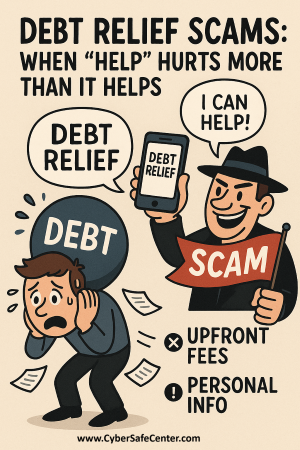When I was 20 years old I moved back home with a mountain of debt. ($7,000 in the late 1980s was a lot.) Thankfully my parents paid off my credit cards and I paid my parents back a couple of decades later.
Not everyone is fortunate enough to have someone that can help. Instead, someone may search the internet for “debt relief” or “how to file bankruptcy”.
Unfortunately, scammers know this too and they love to prey on people when they’re most stressed.
A typical debt relief scam starts with a call, email, or flashy ad promising to wipe away your debt or drastically lower your payments. The catch? They ask for upfront fees or personal information before doing anything. Once you’ve paid or shared your details, the so-called “company” disappears, leaving you in even worse shape.
Real debt relief doesn’t come from secret programs or overnight fixes. Legitimate organizations, such affiliates with the non-profit National Foundation for Credit Counseling (https://nfcc.org), may help negotiate lower interest rates or set up payment plans, but they don’t demand huge upfront fees. The fees should be minimal as noted in this article on consumer advocate Clark Howard’s website. NFCC affiliates also won’t pressure you to sign up right away or guarantee results that sound too good to be true.
If you’re considering debt help, do your homework. Check whether the company is registered with your state, look for complaints online, and never share your Social Security number or bank details without verifying who you’re dealing with.
Remember: financial struggles are tough enough. Don’t let a scammer add insult to injury by turning your search for relief into a deeper trap.
